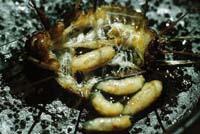Fear of the parasites, silence the cricket

On the island of Kauai, in Hawaii, most of the crickets of Teleogryllus oceanicus are now silent (nine out of ten). The silent crickets have a great advantage: They avoid the attack of the parasitic fly Ormia ochracea, since the female fly has a very sharp ear and locates the male crickets when they sing. Then lay the eggs and the larvae grow inside the cricket.
In the 1990s, researchers at the University of California realized that the crickets were decreasing and fewer kilker songs were being heard each time. But in 2003 they realized that, even though songs were barely heard, the crickets increased: those who did not sing increased.
Silent crickets have softer wings than singers. And as for the duration, the silent crickets of soft wings have advantage over the singers in terms of the parasite, which cannot locate them. But, at least apparently, they have a big drawback in reproduction: they cannot attract the female to not sing. However, silent crickets are abundant, a sign of success in the reproductive period. Well, this success has been possible thanks to a special behavior: the silent crickets are placed around a singer and reproduce when the females approach attracted by the songs.





